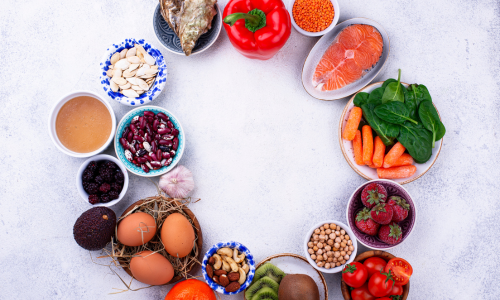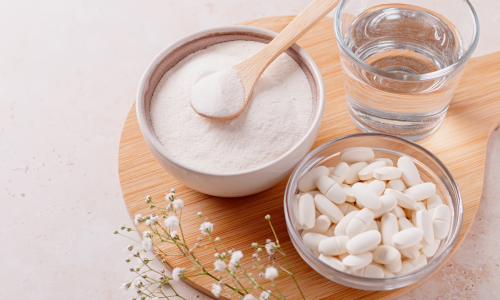Collagen: The Key to Better Skin, Hair, and Nails
July 13, 2023

In the world of wellness, collagen is at the top of the list for maintaining overall health for our bodies. There are 28 different types of collagen found in the human body. While they each have their own purpose, they all work together towards a main goal of providing strength, support and structure to our bodies. Collagen is the primary foundation of our skin, muscles, bones, tendons, ligaments, and other connective tissues. It is also found in organs, blood vessels, and intestinal lining. Depending on where it’s found in the body, it may be rigid as it is in our bones or more flexible like our cartilage. While our bodies can produce their own collagen, eating foods that contain collagen is a way to help stimulate collagen production, too.
The building blocks of collagen are amino acids; largely proline, glycine and hydroxyproline. Proline is responsible for supporting cartilage structure, forming connective tissue, repairing skin damage and healing the lining of our gut. It can be found in foods such as beef, egg white, dairy products, cabbage, asparagus and mushrooms. Glycine is an important antioxidant that clears toxins from the body and also helps transmit nerve impulses. Meat, fish, dairy and legumes are foods that contain glycine. Hydroxyproline supports the repair of damage in our connective tissue. Turkey, chicken and oysters are a few sources of hydroxyproline. In scientific terms, these three amino acids work together to form protein fibrils in a triple helix structure. Your body also needs the proper amount of vitamin C, zinc, copper, and manganese to form that important triple helix. So, in a way, you can think of collagen as the glue or web that holds together our skin, tissues, tendons and bones.

Out of the 28 types of collagen, let’s take a look at the five types that are most commonly known:
- Type I collagen makes up nearly 90 percent of the collagen in our body. It’s in all our skin layers, bones, cartilage, and connective tissues. Dense fibers give these structures their strength and elasticity. It’s an important factor in wound repair and is found in scar tissue. MRC protein products containing collagen are made with this type of collagen.
- Type II collagen is found primarily in cartilage. While its structure is also a triple-helix, it has more loosely packed fibers. Type II collagen provides the cushion in the cartilage for your bones and joints.
- Type III collagen is often found alongside Type I. It makes up muscles, organs, arteries, and some connective tissues in the liver, spleen and blood vessels, and internal organs, including the uterus. MRC protein products containing collagen are also made with this type of collagen.
- Type IV collagen doesn’t create the same structure as the first three types. Instead, it creates a pattern similar to a web and makes up the thin layer outside the cells. It’s also found in the skin, liver, kidneys, and other internal organs like our intestines.
- Type V collagen uniquely helps form cell surfaces, hair and placentas found in pregnant women.
As with many things, collagen production naturally begins to decrease as we get older. Unfortunately, it can’t be measured with a blood test or other medical protocols; but there are signs that your collagen levels are decreasing. Often the first indication of this is in our physical appearance. Fine lines and wrinkles begin to develop and can eventually lead to sagging skin. Facial changes become more obvious with cheeks and the eye area starting to hollow. We can also feel changes on the inside of our bodies as well. Shrinking or weakening muscles along with muscle aches may be a signal of declining collagen production. It may also be evident in stiffer and less flexible joints and ligaments which can lead to osteoarthritis and loss of mobility. Other problems can develop concerning blood flow and gastrointestinal issues due to the thinning of the digestive tract lining.
Several lifestyle choices can also lead to a decrease in collagen production. Smoking, in particular, damages collagen and elastin, leading to wrinkles and slow wound healing. Smoking can constrict blood vessels near your skin’s surface, preventing the efficient delivery of oxygen and nutrients. Eating foods high in sugar and refined carbohydrates causes collagen to become dry, weak and brittle. Too much exposure to ultraviolet light - either naturally or by way of tanning beds - can cause collagen to break down more rapidly and lead to wrinkles and sagging skin. Always be sure to wear adequate sun protection when outdoors and in the sunlight.

While we can make personal changes concerning lifestyle habits and food choices mentioned earlier, none of us can stop the aging process. Fortunately, collagen is available in the form of dietary supplements and can be sourced in many ways. Marine collagen is extracted from the bones, skin and scales of fish. Bovine collagen comes from cows and is thought to help with joint health. Vegetarian or vegan collagen is not ‘true’ collagen as it comes from non-animal sources. However, it is still thought to help stimulate the natural collagen synthesis process. Hydrolyzed collagen refers to collagen that has been broken down into smaller molecules to make it more easily absorbed into the bloodstream. This form of broken down collagen is also known as collagen peptides. While gelatin isn’t strictly collagen, the two are similar; so, it has been used in food, medicine and cosmetics for decades and is a collagen derivative.
Collagen is often included in liquid or powdered supplements that support weight loss. Because it is a form of protein with zero sugar or carb contents, it can provide the kind of dense caloric intake that promotes feelings of fullness and satiety. It also supports the loss of body fat while preventing loss of muscle mass. Consuming collagen can also increase the levels of ghrelin in your body. Ghrelin is the hormone that makes you feel full. In this aspect, collagen may also work as a form of appetite control. Issues with sagging skin due to weight loss can also be supported with collagen supplements as well as easing joint discomfort so that it may become less stressful to exercise.
Collagen supplements are abundantly available in the form of liquid, powder, capsules, or pills. It’s important to be sure the type you take is consistent with your specific goals. Similar to selecting a vitamin or herbal supplement, be sure to look for products that are free from large amounts of preservatives and synthetic fillers. Finding the right collagen supplement that supports your individual needs, in a way that is convenient and healthy, can be an important part of your wellness plan.